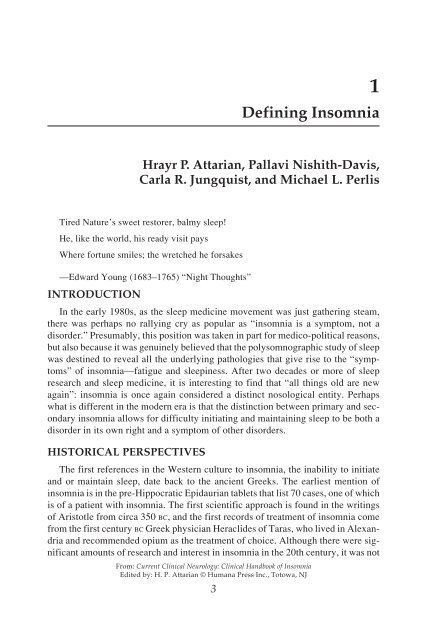Insomnia Insomnia
Insomnia Insomnia
Insomnia Insomnia
You also want an ePaper? Increase the reach of your titles
YUMPU automatically turns print PDFs into web optimized ePapers that Google loves.
Defining <strong>Insomnia</strong> 3<br />
From: Current Clinical Neurology: Clinical Handbook of <strong>Insomnia</strong><br />
Edited by: H. P. Attarian © Humana Press Inc., Totowa, NJ<br />
3<br />
1<br />
Defining <strong>Insomnia</strong><br />
Hrayr P. Attarian, Pallavi Nishith-Davis,<br />
Carla R. Jungquist, and Michael L. Perlis<br />
Tired Nature’s sweet restorer, balmy sleep!<br />
He, like the world, his ready visit pays<br />
Where fortune smiles; the wretched he forsakes<br />
—Edward Young (1683–1765) “Night Thoughts”<br />
INTRODUCTION<br />
In the early 1980s, as the sleep medicine movement was just gathering steam,<br />
there was perhaps no rallying cry as popular as “insomnia is a symptom, not a<br />
disorder.” Presumably, this position was taken in part for medico-political reasons,<br />
but also because it was genuinely believed that the polysomnographic study of sleep<br />
was destined to reveal all the underlying pathologies that give rise to the “symptoms”<br />
of insomnia—fatigue and sleepiness. After two decades or more of sleep<br />
research and sleep medicine, it is interesting to find that “all things old are new<br />
again”: insomnia is once again considered a distinct nosological entity. Perhaps<br />
what is different in the modern era is that the distinction between primary and secondary<br />
insomnia allows for difficulty initiating and maintaining sleep to be both a<br />
disorder in its own right and a symptom of other disorders.<br />
HISTORICAL PERSPECTIVES<br />
The first references in the Western culture to insomnia, the inability to initiate<br />
and or maintain sleep, date back to the ancient Greeks. The earliest mention of<br />
insomnia is in the pre-Hippocratic Epidaurian tablets that list 70 cases, one of which<br />
is of a patient with insomnia. The first scientific approach is found in the writings<br />
of Aristotle from circa 350 BC, and the first records of treatment of insomnia come<br />
from the first century BC Greek physician Heraclides of Taras, who lived in Alexandria<br />
and recommended opium as the treatment of choice. Although there were significant<br />
amounts of research and interest in insomnia in the 20th century, it was not


